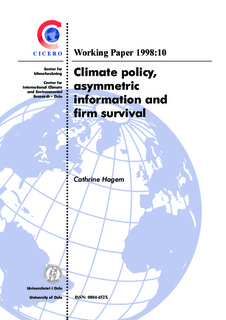| dc.contributor.author | Hagem, Cathrine | nb_NO |
| dc.date.accessioned | 2014-03-17T14:31:38Z | |
| dc.date.available | 2014-03-17T14:31:38Z | |
| dc.date.issued | 1998 | nb_NO |
| dc.identifier.issn | 0504-452X | nb_NO |
| dc.identifier.uri | http://hdl.handle.net/11250/192456 | |
| dc.description.abstract | The purpose of this paper is to compare the effect of different domestic climate policy instruments under asymmetric information when the regulator wants to secure the survival of a specific firm. It is a well-known result from economic theory that emission taxes lead to a cost-effective distribution of abatement across polluters. However, if the regulator wants to ensure the survival of a specific firm, it may need to design policy instruments that reduce the firm’s cost of complying with an emission tax regime.
The climate policy instruments considered in this paper are tradable emission permits with distribution of free permits, emission taxes in combination with a fixed subsidy, and two types of voluntary agreements. It demonstrates first that distributing free tradable permits does not necessarily reduce the possibility of shutdown for a profit-maximizing firm, whereas emission taxes in combination with a fixed production subsidy can have a preventive effect. It further shows that a voluntary agreement where a specific abatement target is set by the regulator can prevent a shutdown but leads to lower welfare than the use of emission taxes in combination with a fixed subsidy. And finally it illustrates that a voluntary agreement designed as a menu of abatement contracts increases social welfare compared to an emission tax regime. | nb_NO |
| dc.language.iso | eng | nb_NO |
| dc.publisher | CICERO Center for International Climate and Environmental Research - Oslo | nb_NO |
| dc.relation.ispartof | CICERO Working Paper | nb_NO |
| dc.relation.ispartofseries | CICERO Working Paper;1998:10 | nb_NO |
| dc.title | Climate policy, asymmetric information and firm survival | nb_NO |
| dc.type | Working paper | nb_NO |
| dc.source.pagenumber | | nb_NO |
